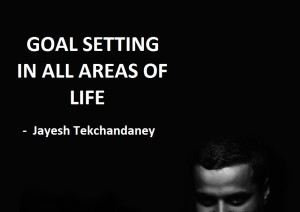
Category: Goals
Atomic Habits: An Easy & Proven Way to Build Good Habits & Break Bad Ones
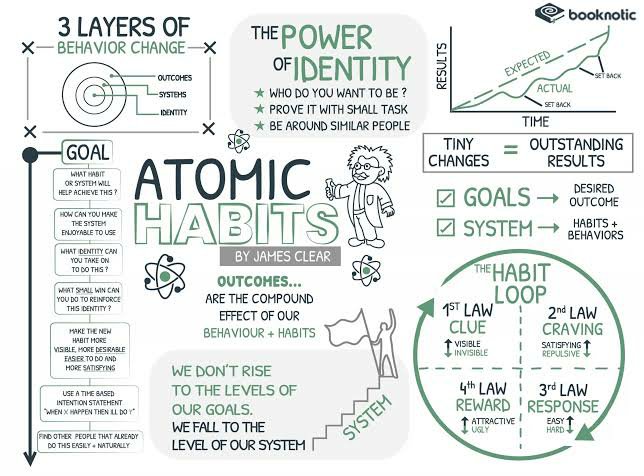
“Your outcomes are a lagging measure of your habits. Your net worth is a lagging measure of your financial habits. Your weight is a lagging measure of your eating habits. Your knowledge is a lagging measure of your learning habits. You get what you repeat.”
Atomic Habits , a breakthrough book from James Clear is the most comprehensive guide on how to change your habits and get better every day. This short note based on the book, is written in two parts. Part one helps us understand the importance of our habits and why they matter. More importantly, it provides answers to a series of “How to” questions that naturally occur in the context of building good habits and breaking the bad ones. In the second part of the note, six important ideas, concepts and principles are summarised that will help the reader in building habits that he or she desires to.
Part One – What ? Why ? How ?
– What is a Habit ?
– Why do Habits Matter ?
– How Habits Work ?
– How To Start A New Habit?
– How to Build Better Habits ?
– How to Break Bad Habits ?
– How to Enjoy Habits that are Hard ?
What is a Habit ?
“Habits + Deliberate Practice = Mastery”
Habits are mental shortcuts. A habit is a routine or behavior that is carried out repeatedly and most of the time automatically. When you are faced with a problem repeatedly, your brain starts to automate the process of solving it. Your habits are sets of automatic solutions that solve the problems you come across regularly.The ultimate purpose of habits is to solve the problems of life with as little energy and effort as possible. A habit is a behavior that has been repeated enough times to become automatic.
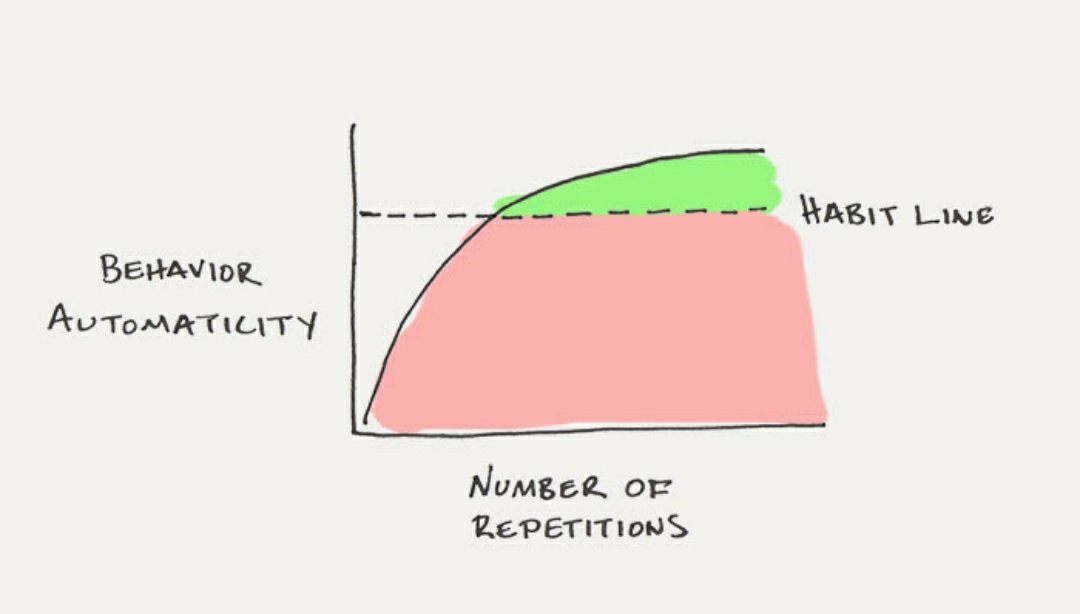
If you find yourself struggling to build a good habit or break a bad one, it is not because you have lost your ability to improve. It is often because you have not yet crossed what James Clear calls, Plateau of Latent Potential. When you finally break through the Plateau of Latent Potential, people will call it an overnight success. Habits are the compound interest of self-improvement.
The upside of habits is that we can do things without thinking. The downside is that we stop paying attention to little errors. Reflection and review is a process that allows you to remain conscious of your performance over time. The tighter we cling to an identity, the harder it becomes to grow beyond it.
Why do Habits Matter ?
IDENTITY -> PROCESSES -> OUTCOMES
Habits shape our identity. Our actions define who we are. Our habits are a reflection of our identity. The more we repeat a behavior, the more we reinforce the identity associated with that behavior. For example: if you make your bed every day, you are reinforcing the identity of someone who is organized and tidy.
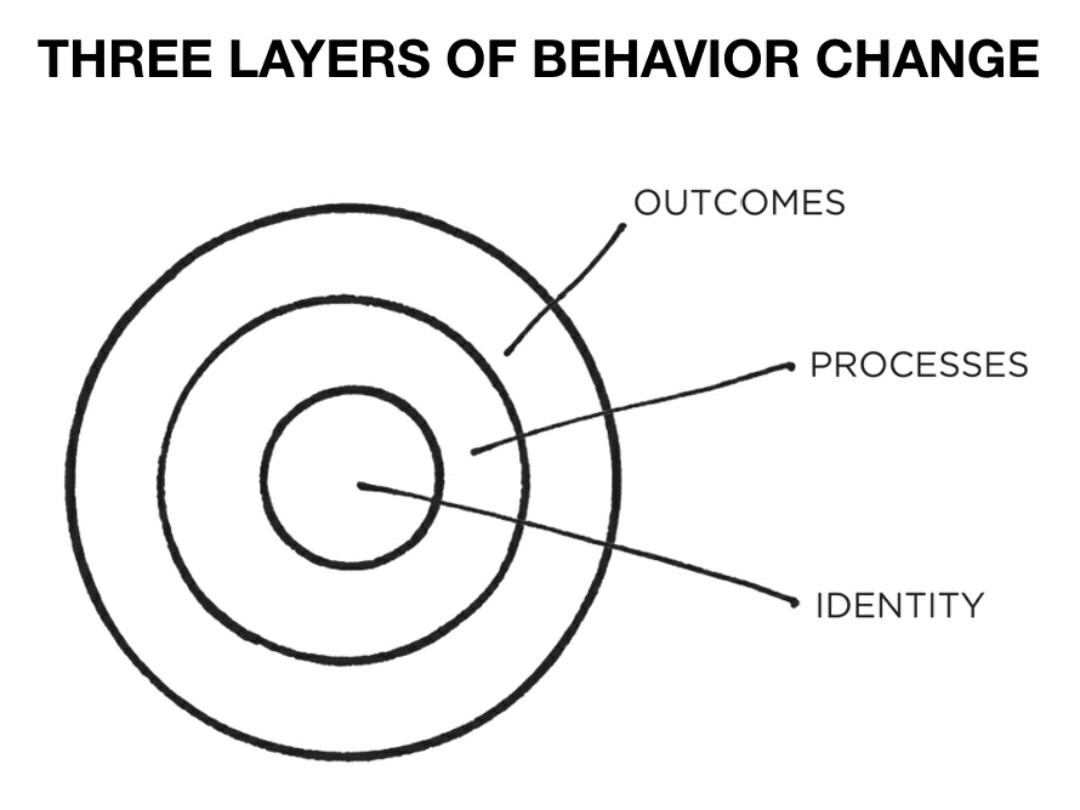
There are three layers of behavior change:
1. Change in your outcomes. This means changing your results, for example, losing weight.
2. Change in your processes. This means changing your habits and systems: for example, developing a daily exercise routine and diet.
3. Change in your identity. This means changing your beliefs: the way you see yourself and the ones around you. For example, if you exercise regularly, you are reinforcing the identity of someone who is fit and healthy.
With outcome-based habits, the focus is on what you want to achieve. With identity-based habits, the focus is on who you wish to become. James Clear argues that the best way to change our identity is to focus on changing our habits. By starting with small, easy habits, we can gradually build up a new identity that is more aligned with our goals. True behavior change is identity change. You could choose and start a habit because of motivation, but you’ll stick with it only if it becomes part of your identity. The real reason habits matter is not because they can get you better results (although they can do that), but because they can change your beliefs about yourself.
How Habits Work ?
CUE -> CRAVING -> RESPONSE -> REWARD
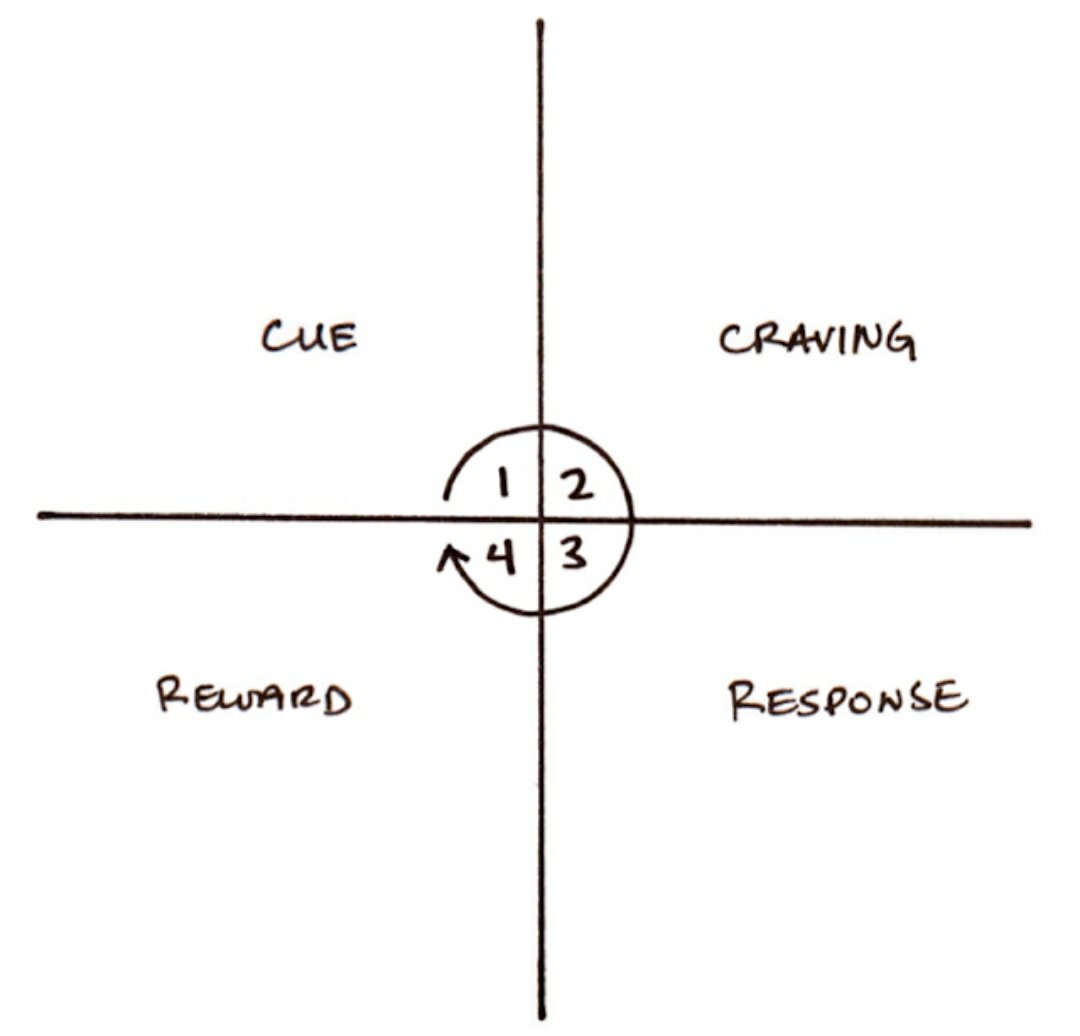
The main components of habit formation are:
1. Cue: It causes your brain to begin a behavior. It is a bit of information that predicts a reward.
2. Craving: It is the motivation behind every habit. Without a desire, we don’t have a reason to act.
3. Response: This is the very habit you perform; it can take the form of a thought or an action.
4. Reward: The end goal of every habit.
Habit formation is the process by which a behavior becomes progressively more automatic through repetition. The amount of time you have been performing a habit is not as important as the number of times you have performed it.You could do something three times in thirty days, or three hundred times. The frequency will always make the difference.
Habits are attractive when we associate them with positive feelings and unattractive when we associate them with negative feelings.
How To Start A New Habit?
‘After [CURRENT HABIT], I will [NEW HABIT].
One of the best ways to build a new habit is to identify a current habit you already do each day and then stack your new behavior on top. This is called habit stacking. The two most common cues are time and location. Creating an implementation intention is a strategy you can use to pair a new habit with a specific time and location. Habit stacking is a strategy you can use to pair a new habit with a current habit.
The habit stacking formula is: ‘After [CURRENT HABIT], I will [NEW HABIT].
Using the Environment to Build New Habits.
Environment is the invisible hand that shapes human behavior. Small changes in context can lead to large changes in behavior over time. Every habit is initiated by a cue. We are more likely to notice cues that stand out. Make the cues of good habits obvious in your environment. Gradually, your habits become associated not with a single trigger but with the entire context surrounding the behavior. The context becomes the cue. It is easier to build new habits in a new environment because you are not fighting against old cue
How to Build Better Habits ?
A habit needs to be enjoyable for it to last. What is instantly rewarded is done again. what instantly punished is ditched. To get a habit to stick You need to feel instantly successful, even if in a small way. The Four Laws of Behavior Change are a simple set of rules we can use to build better habits. For example, If we wish to build a habit of a daily work out, here’s how we can apply this 4 point formula.
1. Make it obvious
Put your gym bag by the door so you see it first thing in the morning.
2. Make it attractive
Listen to your favorite music while you work out.
3. Make it easy
Start your day with a 10-minute walk.
4. Make it satisfying
Write down your progress in a habit tracker.
How to Break Bad Habits ?
Self-control is a short-term strategy when forming habits. You may be able to resist temptation once, but you will most likely not be able to have the willpower to control your desires each time they appear. A better method is to cut bad habits off at the source. For example, if some want’s to get out of the habit of smoking, here’s how he can apply this 4 point formula.
1. Make it invisible.
Hide your cigarettes so you don’t see them every time.
2. Make it unappealing.
Think about how bad your breath smells after you smoking.
3. Make it hard to perform.
Set a goal to work for 25 minutes, even if you don’t feel like it.
4. Make it frustrating.
Remember how bad slacking off feels.
How to Enjoy Habits that are Hard ?
Create a motivation ritual by doing something you really like right before a difficult habit.
Part Two – Ideas, Concepts, Principles
– 1% Improvement Everyday
– The 2-Minute Rule
– The Goldilocks Rule for Staying Motivated
– The Law Of Least Effort
– Walk Slowly, But Never Backward
– Focus on Systems
1% Improvement Everyday
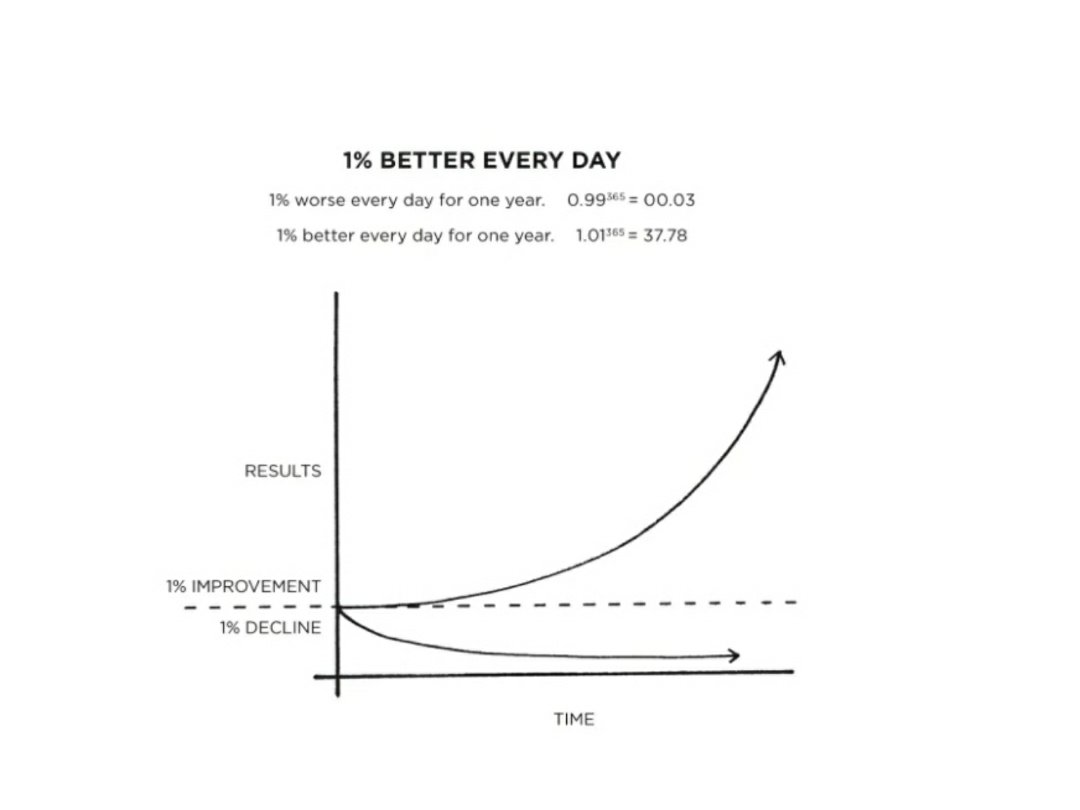
“If you can get 1 % better each day you will end up 37 times better by the time you’re done.
If you get worst 1% every single day end up reaching nearly 0″ – JAMES CLEAR
Getting 1 percent better every day counts for a lot in the long-run. It is about the cycle of endless refinement and continuous improvement. Habits are the compound interest of self-improvement.
The 2-Minute Rule
If you can do an action in two minutes or less, tackle it at the moment — and don’t delay.
The rule was created by David Allen in Getting Things Done & James Clear recommends it for habit building as well: When you start a new habit it should take less than two minutes to do.
Any habit can be scaled down into a 2-minute version:
• Read before bed each night becomes read one page;
• 30 minutes of exercise becomes take out my yoga mat;
• Fold the laundry becomes fold one pair of socks.
The Goldilocks Rule for Staying Motivated
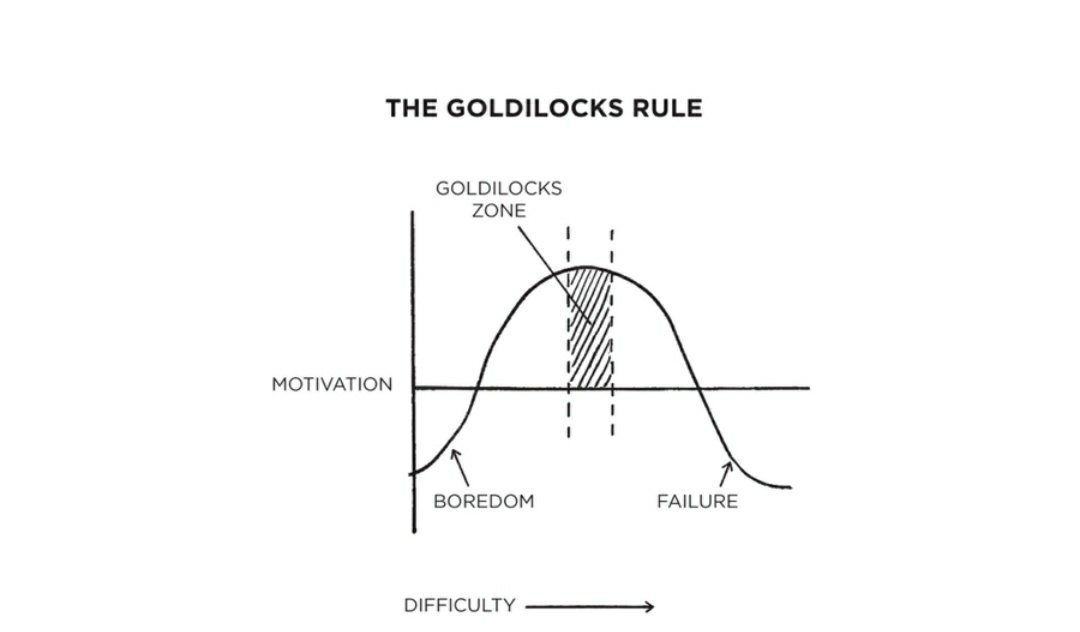
We experience peak motivation when we are performing actions that are right on the edge our current abilities. Not too difficult, not too easy.
The Law Of Least Effort
We will instinctively choose the path that requires least amount of work. This is a universal law that has huge implications in habit formation:
• Create an environment where doing the right thing is as easy as possible.
• Reduce the friction associated with good behaviors. When friction is low, habits are easy.
• Increase the friction associated with bad behaviors. When friction is high, habits are difficult.
Walk Slowly, But Never Backward
It’s easy to get discouraged when you’re trying to change your habits, especially if you don’t see results immediately. But if you keep taking small steps forward, even if they’re not huge, you’ll eventually reach your goals.
For example: if you’re trying to lose weight, you might be tempted to skip a workout or eat a unhealthy meal. But if you do that, you’ll be setting yourself back. It’s better to make small, healthy choices that will help you reach your goals in the long run.
Focus on Systems
Goals are good for establishing a direction, but systems are best for making progress. Goals are about the results you hope to reach. Systems are about the mechanisms that lead to those results.
To conclude, let’s accept that on an average 90% of our daily decisions happen automatically, many shaped by our environment. Thus, most decisions are a habit, not a deliberate choice. Therefore, to make smarter choices, we need to design smarter defaults. And so, habits can be developed by shaping the invisible defaults of life.
The Success Mantra – Distilled From My All Time Favourite Book Reads
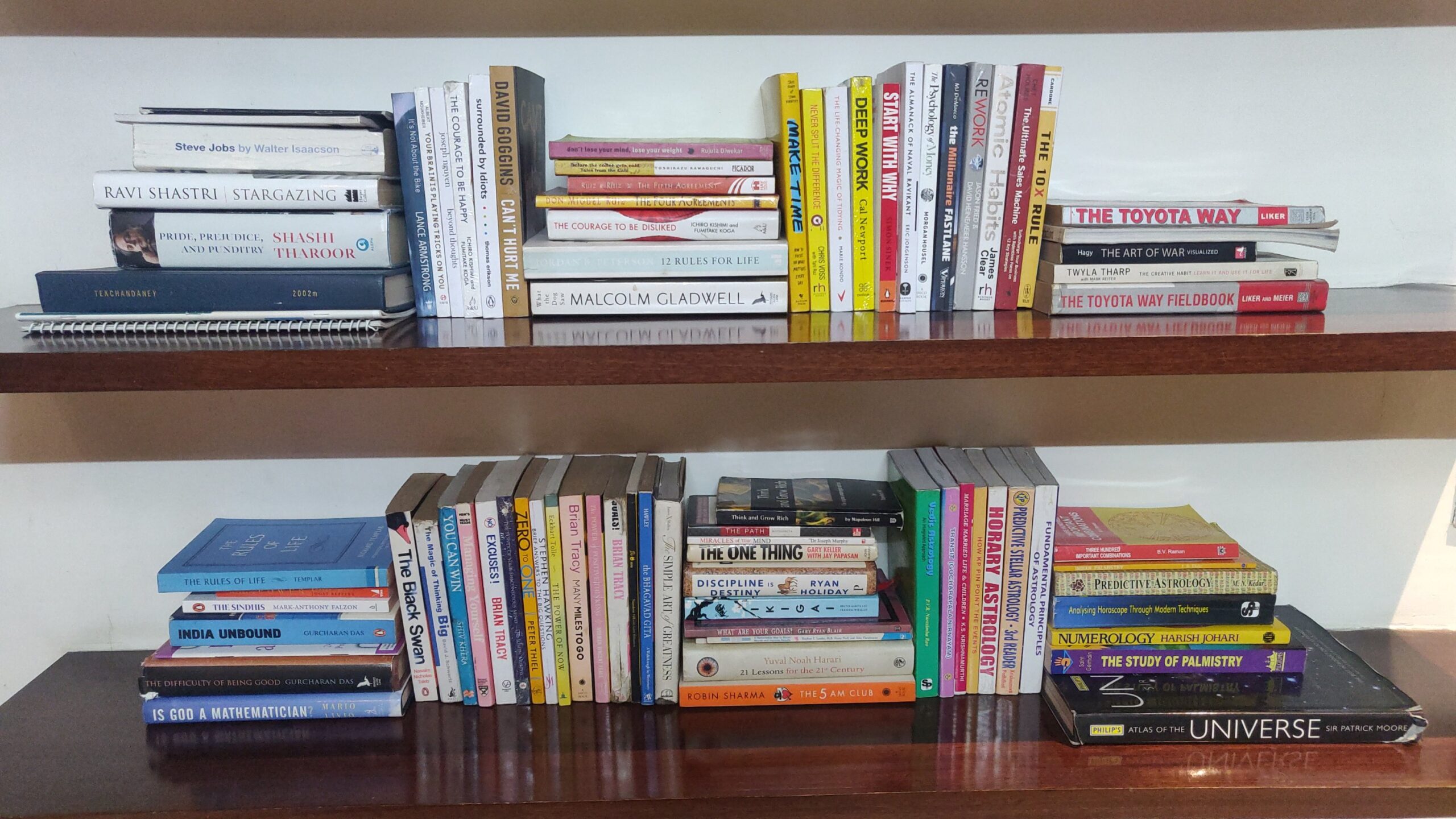
“Whatever you vividly imagine, ardently desire, sincerely believe and enthusiastically act up on must inevitably come to pass.” -Paul Meyer
The Success Mantra is a collection of time tested and proven principles, that I have attempted to summarise in this note, from some of my all time favourite books.
The following is a short brief on the 10 valuable Mantras of Success
1. Definiteness of Purpose
2. Mastering Self-Discipline
3. Positive Mental Attitude
4. Learning from Failure
5. Effective Communication
6. Building a Mastermind Group
7. Taking Action
8. Persistence and Determination
9. Continuous Learning and Growth
10. Giving Back and Serving Others
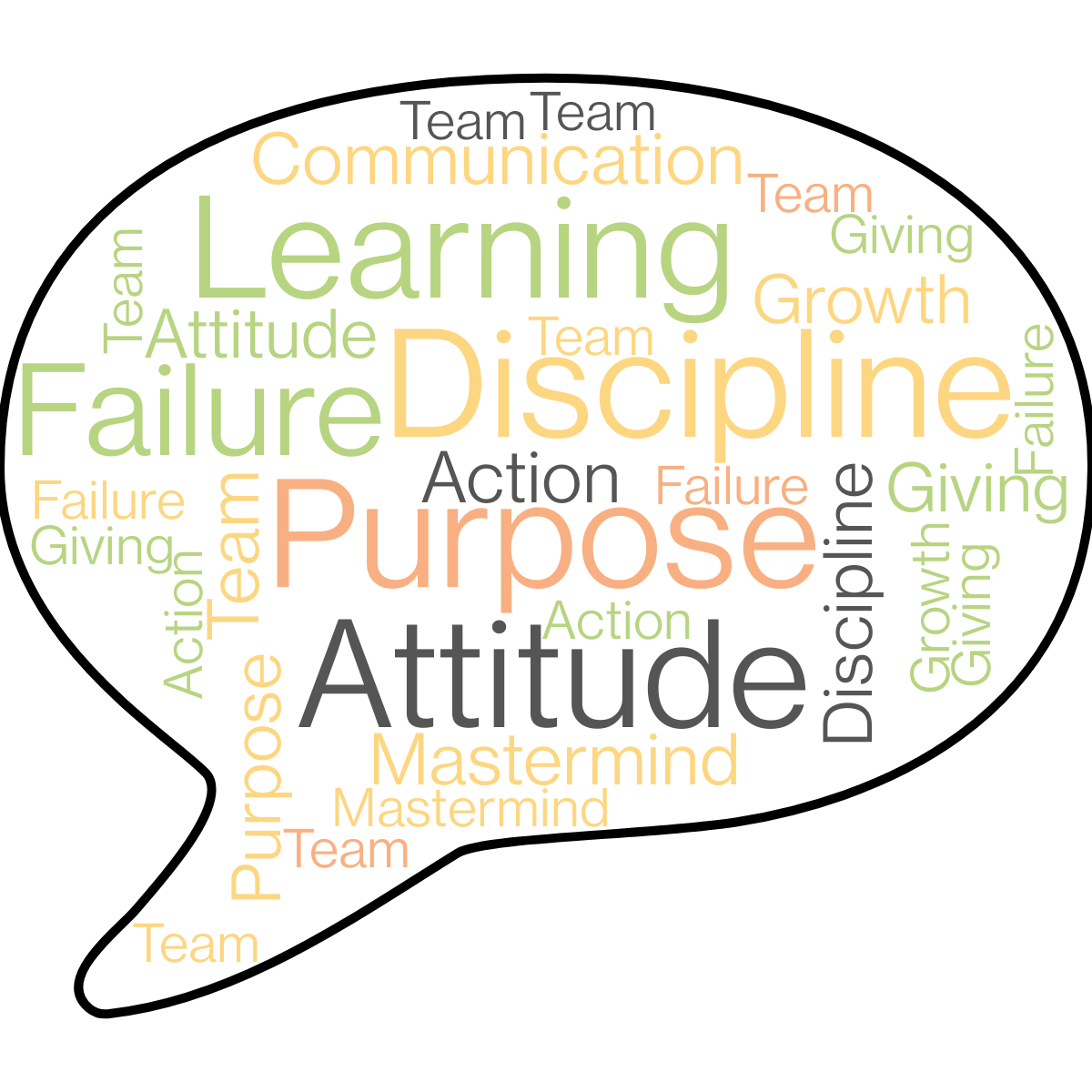
Applying these principles can help everyone unlock their true potential and achieve success in various facets of life.
1. Definiteness of Purpose:
The secret of success is constancy to purpose. – Benjamin Disraeli
Success begins with a clear and specific goal. Define your purpose and create a plan to achieve it. Without a definite purpose, you may drift aimlessly and struggle to find success.
2. Mastering Self-Discipline:
Discipline is Destiny. – Ryan Holiday
Self-discipline is crucial for success. Develop the ability to control your thoughts, emotions, and actions. By mastering self-discipline, you can stay focused, overcome obstacles, and persist in the face of challenges.
3. Positive Mental Attitude:
Keep your face to the sunshine and you cannot see a shadow. – Helen Keller
Cultivate a positive mindset. Your thoughts and beliefs shape your reality. Maintain a positive mental attitude, visualize success, and eliminate negative self-talk. A positive mindset attracts opportunities and helps you overcome setbacks.
4. Learning from Failure:
I have not failed. I’ve just found 10,000 ways that won’t work. – Thomas A. Edison
Failure is not permanent unless you allow it to be. Embrace failure as a learning opportunity and stepping stone to success. Analyze your failures, learn from them, and adjust your approach. Persistence and resilience are key to achieving your goals.
5. Effective Communication:
Communication – the human connection – is the key to personal and career success. – Paul J. Meyer
Develop strong communication skills. Learn to express yourself clearly, listen actively, and understand others. Effective communication builds relationships, inspires collaboration, and opens doors to new opportunities.
6. Building a Mastermind Group:
When a group of intelligent men work in the spirit of Harmony, they will provide much more thought energy than a that of one intelligent man. – Napoleon Hill
Surround yourself with like-minded individuals who support and challenge you. Create a mastermind group of individuals who share similar goals and values. Collaborate, exchange ideas, and leverage collective knowledge and resources.
7. Taking Action:
A dream becomes a goal when action is taken toward its achievement – Bo Bennett
Success requires taking consistent and purposeful action. Avoid procrastination and indecision. Break down your goals into actionable steps and take immediate action. Progress comes from consistent effort and perseverance.
8. Persistence and Determination:
The most essential factor is persistence – the determination never to allow your energy or enthusiasm to be dampened by the discouragement that must inevitably come. – James Whitcomb Riley
Success rarely comes overnight. Develop persistence and determination to overcome obstacles and setbacks. Stay committed to your goals, even when faced with challenges. Success often comes to those who refuse to give up.
9. Continuous Learning and Growth:
Successful men, never stop acquiring specialized knowledge related to their major purpose, business, or profession. – Napoleon Hill
Commit to lifelong learning and personal growth. Acquire new knowledge, develop new skills, and stay updated with industry trends. Embrace a growth mindset and seek opportunities for self-improvement.
10. Giving Back and Serving Others:
When you’re in a position to have gotten so much, the gift at this point is giving back. – Paul Stanley
True success involves making a positive impact on others. Find ways to contribute to society and help others succeed. By serving others, you create a ripple effect of positivity and attract success into your own life.
The Man Who Thinks He Can – Walter D. Wintle
Setting Goals In All Areas of Life
Watch Video Here
https://www.youtube.com/watch?v=iIut9YyEA4A&t=2s
Setting Goals In All Areas of Life
Life has many facets. For a meaningful, happy, balanced and prosperous life, we should set goals in all of these areas.
In this video, I shall share with you, the different areas of our life in which we can set Goals.
– Personal Goals
– Professional Goals
– Financial Goals
– Family Goals
– Health Goals
– Fun, Recreation Goals
– Spiritual Goals
– Social Goals
Personal goals are about what we want for ourselves – that which is important to us and gives us satisfaction, happiness and builds positivity. As compared to goals in other areas of life, we can enjoy the greatest control on the achievement of our personal goals, as it is directly the outcome of our actions and priorities.
We spend most of our most waking hours working for our careers, businesses and jobs This defines our occupation and profession, and is also the means of our livelihood. It provides us the opportunity to put to use our education, knowledge, skills and show case our talents. Setting professional goals is critical as it is through working that we achieve professional growth, build a reputation, get recognition, and above all, earn money, which supports our financial goals. For Home makers, planning and executing home matters can be equally significant professional goals.
Setting financial goals, provides clarity on the means by which we can fulfill our personal and family, needs and wants, for which money is required. Our financial goals could be earning and saving a specific amount of money by a given date for a specific purpose. For some, their financial goal could be putting together, the money needed for buying a house, through their income, reserves, or by borrowing. For others, financial goals could be repaying a loan. Financial freedom can only be achieved by setting goals and taking timely actions on financial goals.
Each of us has many roles to play for our family – starting with being a daughter or son, a sister or brother, a cousin, a spouse, a parent, a grand- parent. Giving our best in each of these roles requires us to set goals.
The most important and yet in many cases the most neglected aspect of our lives is our health. We tend to take our health and well being for granted until we are confronted with a symptom of bad health, or a medical emergency. And from there on, it is only about trying to get back what we have lost.
It’s important that to make the most out of the free time from work, to rejuvenate and energize yourself. Planning for your fun and recreation goals allows to set time and money for their fulfillment.
Knowing our spiritual goals helps us to reflect on the things that really matter to us, our purpose in life, our values, our beliefs. These goals are about connecting with our inner self. Spirituality could mean different things to different people. for some it could be practicing their religion, for others it could be about experiencing peace from visiting places of worship, for some it could be meditation, or practicing silence each day.
We have commitments and roles to play outside of our family. It could be playing an active role in the school PTA, or in the housing society that we live in. It could be our commitments to our friends or the responsibilities to the community that we are a part of. It could making contributions to the well being, education and career of children without families. Defining our social goals will allow us to block time or utilize our free time, for our social commitments.
I hope that this video would have inspired to set your goals…NOW
Goal setting has changed my life for the good. It has the power to change yours.
Set goals in all areas of life, believe in yourself and take action.
How to Write Your Goals

Watch Video Video on “How to Write Your Goals”
Set Goals. Make the positive difference to your life.
My name is Jayesh Tekchandaney, A Chemical Engineer by Qualification and Profession, A business owner by Occupation, Author, Speaker and Coach at Heart. My purpose in life is to touch, move, inspire and make a positive difference to people lives by sharing the good things and positivity that I have learned and been blessed with.
The one thing that has made a big difference to my life is the habit of Setting Goals. And today, I shall share with you, how to write your goals. Because writing your goals makes them real, it gives them a physical form, it provides you with direction and allows you to focus on what is important.
As an example, Let’s start with some of my goals My personal and professional goal is to write a book, related to my field of work. The way I would write my goal is… I have written a book on the subject of Industrial mixing. The book is published by John Wiley Publications by December 31, 2017.
As I mentioned earlier, my personal goal is to make a positive difference to people’s lives. For that, I would write my goal as I speak at conferences, seminars organisations, schools, and colleges inspiring people to set goals, and working for their achievement.
1. Make sure you write your goals as if your goal had already been achieved, e.g. I have written…., I speak. This is because the subconscious mind has to given a command in the present and made to believe that you are on the road to accomplishing your goals.
2. Write you goals in the personal tense. All of your goals should start with the word I. The I should be followed by an action verb.
I speak at conferences…
3. While writing goals, we need to set ourselves a deadline for achievement of the goal. In my case, it is the book being published by December 31, 2017. Setting a date, motivates us to block time, and take action towards achievement of our goals.
4. Also, Write your goals in the positive sense. For example, if your goal is to stop being lazy and begin to work hard, Instead of saying, I am not lazy, write, I am hardworking.
“Everything is Hard before it is easy,” said Goethe, the German philosopher. Setting Goals, writing them and seeing them manifest is easy when you choose to take action. I have been blessed and have experienced the joy of accomplishing many of my goals by following the goal setting process. My goal on the book being published is already achieved. And I continue to speak passionately about goal setting to those around me.
Set Goals
Goals give a sense of meaning and purpose to our life. Goal setting, along with careful planning provides a sense of direction to keep us focused on what we want and to work towards its achievement.
Our life has many facets – all of these can be classified in 6 major areas; personal, professional, spiritual, physical and mental, family and social, financial. For a meaningful and successful life, we should set goals in all of these areas.
Goals to me are SMART dreams. By SMART, we me Specific, Measurable, Achievable, Realistic and Time Bound. A goal has be specific, it has to be clearly defined. A goal has to be quantifiable – something that can be measured, it has to be achievable and attainable within a lifetime, it has to be realistic – something that can be experienced in reality. Above all, the goal is a dream with a deadline for achievement. It is time bound.
Written goals are the seedbeds of accomplishment. The important thing while setting goals is that you need to write them, because writing your goals forces you to crystallize and clarify your thinking. It is said that the human mind has more than 4,000 thoughts each days. Writing down the thoughts which matter, helps you focus on what is necessary and keeps you on course. Written goals form the basis of measuring progress. Written goals produce motivation. Written goals form the basis of an action plan. Above all, written goals stimulate visualization.
Often people set goals, but don’t achieve them. This is because they don’t take the action required to achieve to goals. The most important aspect of achieving your goals is taking action, with enthusiasm. Having set your goals, you need to create an action plan for their achievement.
Setting goals has changed my life and the lives of many around the world. It will change yours as well.
“Whatever you vividly imagine, ardently desire, sincerely believe, and enthusiastically act upon, must inevitably come to pass.” – Paul Meyer
I Read Because…
I Read Because…
“Leaders are readers, and readers are leaders,” echoed Vivek (in 2006), when I told him that I don’t read.
Today, not reading a book each day, matters as much as drinking water or having food. I read constantly, I read in the car, bus, train or the airplane, I read when I am waiting to meet a customer, I read when waiting at the airport, I read when others are watching TV, I read on vacations and business tours, I read before I sleep, I read while having my morning cup of tea, devouring new books and revisiting some that I have read before.
My book shelves at home and office keep over flowing, with the books that I continue to accumulate from book stores, from train stations, from airports, and from road side vendors. It’s hard for me not to stop by and oogle at books when I am around these places. Buying a book is a temptation I find hard to resist.
I read autobiographies, and biographies because I love to be in the company of great men and women who have inspired generations. I read business and management books so that I can implement the best practices at work. I love to read psychology and human behaviour, because I value people and beleive in building strong relationships. I read religion and study spirituality, to understand. I read because I like to lose myself in the book. I read because there’s always something new to learn. I read because the world is changing faster than I can imagine. I read because it inspires me to write.
Living a complete and balanced life depends on making good use of the knowledge that we accumulate. We are constantly and subconsciously guided by the information we consume.It is because of reading books, that I have been able to set and achieve goals that have made a positive difference in the multi-facated wheel of my life. It is the habit of reading that has transformed me, my life, my thoughts, my personality, my work, my relationships, my beliefs, my values and my choices.
Above all, I read because I wish and pray that Maahir and Shourya will read. My books will be the greatest wealth that my children will inherit.
Jayesh Tekchandaney
Tekchandaney@gmail.com
Set Goals…
“If I have seen far, it is because I have stood on the shoulders of Giants”. God has been kind. I feel blessed to have been born in a wonderful and loving family; to have the best of education, and teachers who have touched moved and inspired; friends who have always stood by my side and encouraged; and colleagues who are supportive.
The one thing that has made a difference to my life, it is the habit of setting goals and an unwavering faith is Paul Meyer’s quote, “Whatever you vividly imagine, ardently desire sincerely believe and enthusiastically act up on must inevitably come to pass.”
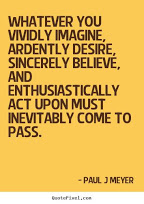
Life was pretty much usual and routine, until one evening in the year 2006, when I met up with my childhood buddy, Vivek Savla. Vivek attended a program on Leadership and Management, and shared with me his learning. He asked me what my goals were. The first thing that came to my mind was about our manufacturing business, and I told him that my goal was to achieve a certain number in business, work hard, to be the best in the field. What else? he asked. I said I wanted to be happy, have a great life, have lots of money, take care of the family. He looked up to me and said, who doesn’t want that? That’s not a goal. That’s wishful thinking.
Honestly, I was lost, I really didn’t know nor did I understand what my goals were. Like me, many of us don’t realize the importance of goals. We don’t have goals because we don’t know how to set them. Often, it is the fear of failure that stops us from setting our goals.
Imagine watching a football game, with 2 teams and 22 players on the field playing the game – a football game with no goal posts. Imagine leading a life, where each day all that we do is get up in the morning, have breakfast, go to work, come home, watch television and go to sleep; wishing and hoping that tomorrow things will get better for us. But that seldom happens, and will not until we take control of our lives and our goals. It was that evening with Vivek, that I learned the greatest lesson of my life – “Set Goals”.
Goals give a sense of meaning and purpose to our life. Goal setting, along with careful planning provides a sense of direction to keep us focused on what we want and to work towards its achievement.
Our life has many facets – all of these can be classified in 6 major areas; personal, professional, spiritual, physical and mental, family and social, financial. For a meaningful and successful life, we should set goals in all of these areas.
For example, my personal goal is be a bestselling author, a motivational speaker, and coach. My professional goal is to take our company to a leadership position in the field of mixing equipment in India and across the world. My spiritual goal is to remain calm and 
Written goals are the seedbeds of accomplishment. The important thing while setting goals is that you need to write them, because writing your goals forces you to crystallize and clarify your thinking. It is said that the human mind has more than 60,000 thoughts each days. Writing down the thoughts which matter, helps you focus on what is necessary and keeps you on course. Written goals form the basis of measuring progress. Written goals produce motivation. Written goals form the basis of an action plan. Above all, written goals stimulate visualization.
Goals to me are SMART dreams. By SMART, we me Specific, Measurable, Achievable, Realistic and Time Bound. A goal has be specific, it has to be clearly defined. A goal has to be quantifiable – something that can be measured, it has to be achievable and attainable within a lifetime, it has to be realistic – something that can be experienced in reality. Above all, the goal is a dream with a deadline for achievement. It is time bound.
How then do you set goals and write them? When you begin to set goals, write down your dream list. A dream list will have everything that you wanted to have – a loving family, a big house, promotion at work, more money; a dream list will have everything you would like to do – grow you business to the next level, enjoy a vacation at your favorite destination. Just write down everything that you would like to have and do, as if there are no limitations at all.
Once you have written your dream list, you need to write them down as your SMART goals.
For example, my dream is to have a BMW car. But my SMART goal is “To drive my own BMW, 5 Series, White Color, by December 22, 2017”. Specific, Measurable, Achievable, Realistic and Time Bound.
I am often asked, “If it was so easy, why don’t most people achieve their goals?”
The answer to this question is explained in my favorite quote, by Paul Meyer, “Whatever you vividly imagine, ardently desire, sincerely believe and enthusiastically act up on must inevitably come to pass.”
The starting point of attainment of all goals is having an ardent desire. Your desire for the goal must be so intense that it will energize you to take action. It will give you the inner strength and drive to overcome any obstacle that lies between you and your goal.
The greatest obstacle that lies between you and your goals, is your lack of self belief. For achieving your goals, you need to believe in yourself and in your abilities. To overcome the negative thoughts and emotions that may crop in, you need to take complete responsibility for your situation. Once you accept total responsibility for your life, there are no limits on what you can be, do or have. Every step that your take with responsibility towards your goals builds your belief that you can set and achieve even bigger goals in the future.
Often people set goals, but don’t achieve them. This is because they don’t take the action required to achieve to goals. The most important aspect of achieving your goals is taking action, with enthusiasm. Having set your goals, you need to create an action plan for their achievement. You need to prioritize your goals, make a list of all tasks that have to be completed for accomplishing the goal, schedule time and set deadlines, create measures and standards to track progress, build the competency and skills required for achieving the goals, exercise self-discipline, identify obstacles and their possible solutions, identify people, groups and organizations who can help you in achieving your goals. Work hard to achieve your goals. There is no substitute to hard work. Action with Passion, Patience and Persistence is the key to achieving your goals.
My personal experience is that when you are absolutely clear about your goal, you do not even need to know where and how to achieve it. By simply deciding what you want, you will begin to get attracted towards your goal and your goal begins to move towards you.
Set Goals and take charge of your life. I’ll be happy to have achieved my goal through your’s.
God Bless
Perfecting Excellence
“Perfection is not attainable. But if we chase perfection, we can catch excellence”, Vince Lombardi
